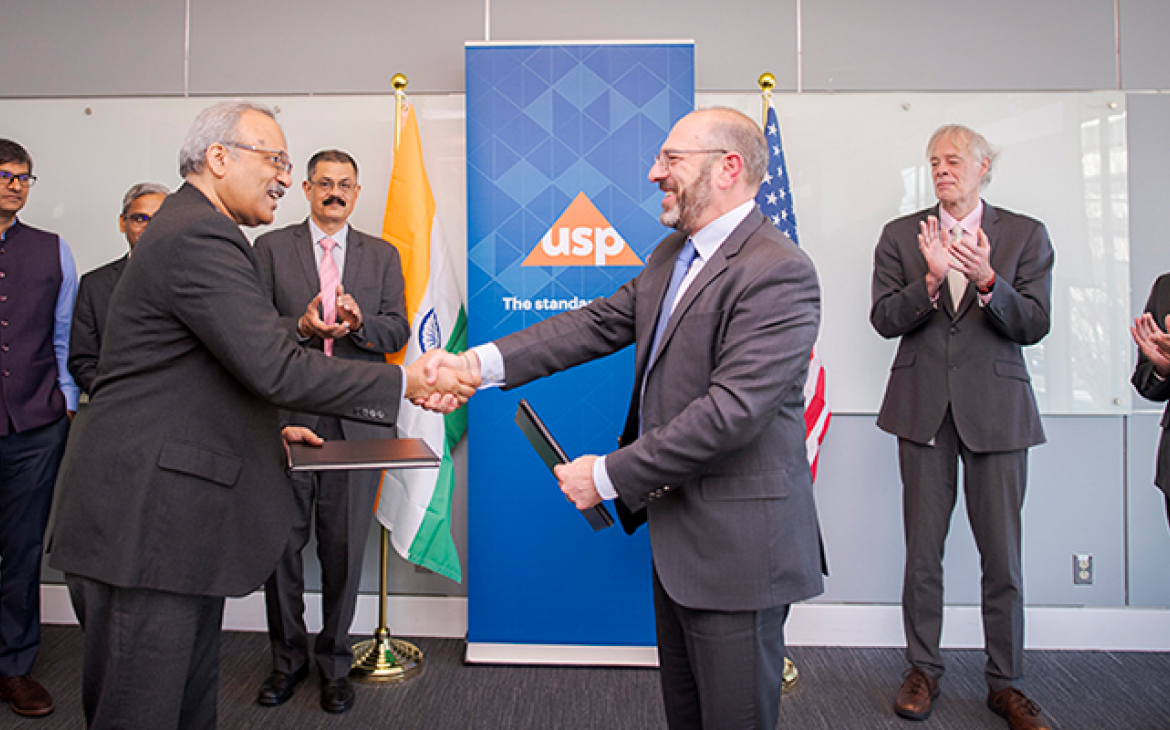
By: Deborah Davidson, Membership Director, National Council on Patient Information and Education (NCPIE)
October marks the 30th Talk About Your Medicines Month (TAYMM)—an annual opportunity spearheaded by NCPIE to focus attention on the value that effective, high quality communication about medicines can play in promoting better medicine use and better health outcomes.
Year round, USP helps to ensure the quality of the ingredients in the medicines we take. Yet even the highest of quality ingredients in the most useful of medicines can be harmful if the medicines are taken incorrectly. Consumers’ understanding about their medications—and how to safely use, store and dispose of them—is learned through effective communication and effective education. TAYMM complements the work and efforts of USP by stimulating conversations between consumers and their healthcare providers about the medicines they may take.
The ultimate objective of any communication between patients and their healthcare providers is to improve the patient's health and medical care. Good communication is at the heart of good medicine. In fact, data have shown that patients reporting good communication with their health providers are more likely to be satisfied with their care, follow advice and adhere to the prescribed treatment. Of course, communication is a two-way street. Consumers need to be aware of the questions to ask, and healthcare providers in turn must be able to share medical information in a meaningful way that their patients are able to understand and act on. To that end, Talk About Your Medicines Month empowers both. The TAYMM theme for 2015 is: Safe use. Safe storage. Safe disposal.
Safe Use
NCPIE encourages healthcare providers and pharmacists to ensure that their patients leave their offices with a clear understanding about how to take the medicines they are prescribed, with clarity about expected health outcomes, and potential side effects and risks. For patients, NCPIE has developed a list of 10 key questions that they should be sure to ask their healthcare providers about when it comes to the medicines they take. These include:
- What is the brand and/or generic name of the medicine, and what specifically is it for?
- How and when do I take it, and for how long?
- What side effects should I expect, and what should I do about them?
- Should I take this medicine on an empty stomach or with food?
- Should I avoid any activities, foods, drinks, alcohol or other medicines while taking this prescription?
- If it’s a once-a-day dose, is it best to take it in the morning or evening?
- Will this medicine work safely with any other medicines I’m taking, including over- the-counter medicines?
- When should I expect the medicine to begin to work, and how will I know if it’s working?
- How should I store this medicine—room temperature, or in the refrigerator?
- Is there any additional written information I should read about the medicine?
Safe use resources for both healthcare providers and consumers are posted to NCPIE’s 2015 TAYMM page and to TalkBeforeYouTake.org
Safe Storage
Safe and appropriate medicine use involves making sure that all medications, including prescription and OTC medicines, are stored safely—out of sight and reach of curious young children. Annually, more than 60,000 children—or roughly four busloads of children per day—are brought to the emergency room each year because they got into medicines that were left within reach. Conversations and reminders about the importance of safe storage can prevent these accidents. Safe storage tips include:
- Store medicines in a safe location that is too high for young children/grandchildren to reach or see.
- If children live with you or are visiting, don’t leave medicine or vitamins out on a kitchen counter or bedside table, even if you have to take the medicine again in a few hours. Instead, set a reminder for yourself.
- Relock the safety cap on medicine bottles.
- Remind babysitters, houseguests, and visitors to keep purses or coats that have medicines in them up and away and out of sight when they are in your home if young children or grandchildren are present.
Safe storage resources for both healthcare providers and consumers are posted to NCPIE’s 2015 TAYMM page and to www.UpandAway.org.
Safe Disposal
Safe disposal of expired or unused medicines is important. Almost all medicines can be safely disposed of by using “take-back” programs at participating pharmacies or thrown away in the household trash. Conversations about safe disposal should include these best practices for throwing medicines away:
- Mix the medicines (do not crush tablets or capsules) with an unpalatable substance such as dirt, kitty litter, or used coffee grounds.
- Then, place the mixture in a container such as a zip-top or sealable plastic bag, and throw the container away in your household trash.
- When disposing of a prescription product, remove the label and/or scratch off all personal information on the label.
- Note, there are a handful of medications—primarily, strong prescription painkillers—that, because of their particular danger to children or pets who sometimes get in to trash and the illegal “street market” for these powerful medications—should only be disposed of through a drug take-back program or flushing down the toilet. The list of these medications, together with more specific disposal instructions, is available here.
Safe disposal resources for both healthcare providers and consumers are posted to NCPIE’s 2015 TAYMM page and to AwareRx.org
Effective, high quality communications about medicines can have an important impact on promoting safe medicine use, storage and disposal. Kick off a conversation and be part of the Talk About Your Medicines Month solution.
Disclaimer: The views expressed in this article are the views of the author and not necessarily those of USP.
NCPIE, organized in 1982, is a non-profit coalition of diverse member organizations committed to improving communication of information on appropriate use of medicines to consumers and healthcare professionals. Over the last decade in addition to her membership responsibilities, Ms. Davidson has helped produce a variety of important educational resources that address prescription drug abuse prevention, the importance of medicine adherence, acetaminophen safe-use and other relevant topics. To learn more, visit www.talkaboutrx.org.
USP & NCPIE: USP has served continuously on NCPIE’s board of directors since our founding in 1982, and is a voting board member within the healthcare professional organizations membership category. USP’s Nelufar Mohajeri, M.A., M.C., Head, Global Stakeholder Engagement serves as the NCPIE board representative. Additionally, NCPIE is a USP Convention member organization.
NOTE: The views and opinions expressed in this blog are solely those of the guest author and should not be interpreted to be those of the U.S. Pharmacopeial Convention.


